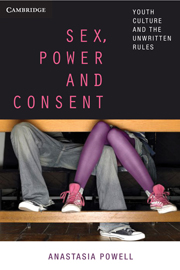5 - Consent
Negotiating consensual sex
Published online by Cambridge University Press: 03 May 2011
Summary
Negotiations of sexual consent, while popularly placed in the realm of the personal and most intimate of human experience, can instead be understood to take place within a specific social and cultural context, effectively governed by gendered discourses about sex, love and consent and as such subject to various unwritten rules. These rules are not simply imposed by society onto individuals; they are taken up by individuals and embedded in their perceptions, feelings and practices, operating largely below the level of conscious reflection. It is clear from the young people's experiences discussed in preceding chapters that these discourses underlie not only experiences of forced sex, but also experiences across the continuum of sexual violence. I argued in Chapter 4 that in order to significantly disrupt the social reproduction of these discourses, it is vital both to actively promote a new set of norms for negotiating sexual encounters at the level of individual practice, and to consistently challenge their reproduction across multiple fields of interaction, including social institutions. Indeed the law – as a key social institution – has been the subject of much feminist lobbying and law reform over the last 40 years. Yet, while laws defining the meaning of consent have changed in very important ways, the translation of these changes into improved justice for victims/survivors of sexual violence, or into young people's understanding of consent, has not been a straightforward process.
- Type
- Chapter
- Information
- Sex, Power and ConsentYouth Culture and the Unwritten Rules, pp. 86 - 105Publisher: Cambridge University PressPrint publication year: 2010
References
- 1
- Cited by



